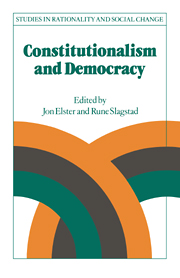Book contents
- Frontmatter
- Contents
- Notes on contributors
- Introduction
- 1 Gag rules or the politics of omission
- 3 Democracy as a contingent outcome of conflicts
- 3 Consequences of constitutional choice: reflections on Tocqueville
- 4 Liberal constitutionalism and its critics: Carl Schmitt and Max Weber
- 5 Democracy and the rule of law: some historical experiences of contradictions in the striving for good government
- 6 Neo-federalism?
- 7 Precommitment and the paradox of democracy
- 8 American constitutionalism and the paradox of private property
- 9 From liberal constitutionalism to corporate pluralism: the conflict over the enabling acts in Norway after the Second World War and the subsequent constitutional development
- 10 Arguments for constitutional choice: reflections on the transition to socialism
- 11 Constitutions and democracies: an epilogue
- Index
4 - Liberal constitutionalism and its critics: Carl Schmitt and Max Weber
Published online by Cambridge University Press: 05 June 2012
- Frontmatter
- Contents
- Notes on contributors
- Introduction
- 1 Gag rules or the politics of omission
- 3 Democracy as a contingent outcome of conflicts
- 3 Consequences of constitutional choice: reflections on Tocqueville
- 4 Liberal constitutionalism and its critics: Carl Schmitt and Max Weber
- 5 Democracy and the rule of law: some historical experiences of contradictions in the striving for good government
- 6 Neo-federalism?
- 7 Precommitment and the paradox of democracy
- 8 American constitutionalism and the paradox of private property
- 9 From liberal constitutionalism to corporate pluralism: the conflict over the enabling acts in Norway after the Second World War and the subsequent constitutional development
- 10 Arguments for constitutional choice: reflections on the transition to socialism
- 11 Constitutions and democracies: an epilogue
- Index
Summary
Carl Schmitt occupies a special position within the field of modern legal and political theory. On the one hand, Schmitt is one of the foremost specialists in liberal constitutionalism; but on the other hand, he is also one of its keenest critics. His Verfassungslehre of 1928 dissects the constitution of the Weimar Republic, interpreting it along the lines drawn up by the German constitutional tradition from Wilhelm von Humboldt and Lorenz von Stein to Georg Jellinek and Max Weber. In all of his writings, Schmitt unites themes drawn from both conservative and radical critiques of the ideology of constitutionalism. He asserts a discrepancy between idea and reality, and, turning reality against idea, finally rejects the concepts of the liberal Rechtsstaat and the parliamentary legislative state as outdated bourgeois ideology. His alternative is absolute state power.
This chapter is built around Schmitt's theory. I shall begin with a brief introduction to the liberal theory of the Rechtsstaat based on Schmitt's Verfassungslehre [I]. The tension existing between the liberal Rechtsstaat and the Hobbesian Machtstaat forms the basis of Schmitt's criticism and rejection of liberalism [II]. In his alternative theory of politics and law, Schmitt combines two motifs: political Machiavellianism and normative decisionism [III]. Examination of Schmitt's work sheds considerable light on the political theory of Max Weber. Weber – who may rightly be considered a forerunner of Schmitt – also occupies a position opposed to Schmitt's in seeking to incorporate Machiavellian power-politics within a constitutionaldemocratic framework [IV].
- Type
- Chapter
- Information
- Constitutionalism and Democracy , pp. 103 - 130Publisher: Cambridge University PressPrint publication year: 1988
- 7
- Cited by

